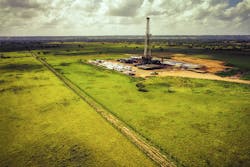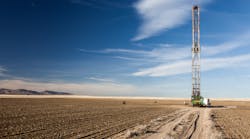An industry-funded study in the U.K. found that decommissioned oil and gas wells can leak methane into the atmosphere, but contribute less of the gas to the air than agricultural use of the same land.
Researchers from the ReFINE (Research Fracking in Europe) consortium tested soil methane levels at 102 decommissioned onshore oil and gas wells across the U.K.
Results showed that estimated levels of methane escaping from the wells were low when compared to levels of the gas produced by any grazing animals on the land once it returned to agricultural use.
As part of the study, researchers also tested one well that was abandoned before modern decommissioning regulations were in place. They found that methane levels there were more than ten times higher than for the average decommissioned well. This highlights the importance of ensuring that oil and gas wells are properly decommissioned and monitored to reduce the impact of any future methane leaks, the researchers said.
Professor Fred Worrall in the Department of Earth Sciences at Durham University said: “Overwhelmingly wells are properly decommissioned and our study shows that when methane does leak the levels are low, for example when compared to methane produced by the agricultural use of the land.
“The point is that even with proper decommissioning you will still have those wells that leak as cement cracks and steel corrodes and so monitoring is important.”
At 31 of the sites surveyed, methane levels at the soil surface were significantly higher than those found in control samples taken from nearby fields. But another 39 sites showed much lower levels of methane in the soil compared to control samples, suggesting that soils on some decommissioned sites could act as a sink or that the wells had not leaked methane gas.
The remaining sites showed methane concentrations similar to the surrounding fields.
The study also found that 40 percent of the most recent wells showed leaks, suggesting that leaks develop early in the life of a decommissioned well.
Methane levels did not increase significantly with the age of the well since drilling.
Industry body United Kingdom Onshore Oil and Gas (UKOOG) said that the findings should reassure people.
“What ReFINE has shown is that the public should have no health or environmental concerns about emissions from properly decommissioned wells adhering to current industry standards,” commented UKOOG chief executive Ken Cronin.
“Indeed the research has found that in the minority of cases where they have recorded some methane emissions from decommissioned wells, these emissions are typically less than one would get from just a handful of livestock grazing in the same fields.”
ReFINE is led jointly by Durham and Newcastle universities and funded by the Natural Environment Research Council (U.K.), Shell, Chevron, Ineos, GDF Suez, Centrica, the European Union’s Horizon 2020 programme and the Environment Agency.


